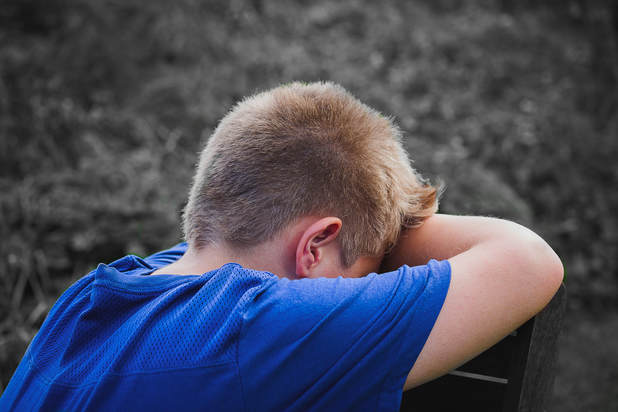|
Abby Elder. Provisional Psychologist Picture this...
An eruption of screaming and fighting pierces your ears. Again. Your eight year old son rushes into the lounge room sobbing and throws himself on the couch next to you. Another fight with his older sister over who gets to choose what game to play together. ‘You are supposed to be having fun and building lifelong memories to be treasured forever!’ You think to yourself. When did having fun become so hard? If your child sometimes appears to be made of glass, try these 9 ways to build resilience, or the ability to recover from the inevitable disappointments and challenges of life. 1.Growth mindset Encourage a practice of gratitude and excitement by asking your child to identify one thing they are looking forward to the next day. 2. Define resilience in age appropriate ways Look for examples in nature like a tree that has continued to grow despite a concrete barrier. Or name some models of a can do attitude in literature or film. 3. Practise the calm How do you feel when you are told to just calm down? Most adults know the bubbling rage that this phrase can instill yet we continue to use this command when a child is overwhelmed. Instead try practicing the calm with your child every day, like taking a vitamin supplement. This can be a three minute body scan that encourages your child to be more aware of body sensations that are signals they need help. Or try green grounding, which encourages a short connection to nature. Think setting a five minute timer on your phone and going cloud gazing. The key to practicing the calm is scheduling it every day at a time when it is achievable. 4. Check your own reactions and expectations Emotions are catching. Children can perceive when we have unrealistic expectations that we are placing on them. Such as, my child should be invited to every birthday party thrown by every classmate. Or, I am a terrible parent because my child is struggling to comprehend long division. Try practising some short, self compassion meditations that will build your own resilience. 5. Encourage problem solving, don’t solve the problem Resiliency is not a force field that repels life’s problems. It’s the confidence that no matter what problem we are faced with there are solutions. Problem solving just like any skill needs to be learned. Parents often want to swoop in and solve their child’s problems, however this is taking away the opportunity from your child to learn how to solve their own problems. 6. Skill building missions Plan for ways your child can prove to herself she is a problem solver. Let her pay for the produce next time you duck into the shops. Bite your tongue when your five year old picks an outfit that slightly clashes, at least they are dressed! Encourage your 11 year old to create a menu of family dinners. 7. Call out your own fragile behaviour, but don’t shame it Name when you are feeling a bit fragile, and role model problem solving through the uncomfortable feelings to your child. 8. Acknowledge the good when it happens We are good at identifying the tough times but we often do not pause and say how great things are going. By acknowledging the good we remind our children that nothing is permanent, the bad times come, and then so do the good times. 9. Encourage accountability Resiliency is about doing what we can with what we have. Encourage your child to name what is in their control the next time they are having a tough time. This will make the path to solutions more clear. For support for you or your child/ren, learn more about our online parenting program With an estimated 90% of children and adolescents playing video games (Lenhart et al.2008), the impacts that video games have on users is a fierce and ongoing debate in academic literature. There is a wealth of literature that reveals that there are both positive and negative outcomes associated with gaming. Positive ImpactsSome academics hold the perspective that gaming is a modern form of play and should be considered as a contemporary means of psychosocial development. With the increasing social connectivity built into modern video games, playing online provides an opportunity to connect and cooperate with peers. Social connection is an often cited as a positive outcome for users. Yet, researchers have discovered various other benefits too. Playing ‘shooter’ games has been shown to promote some specific cognitive skills. This is likely to do with the visually rich environments and rapid attentional demands within modern games. Recent literature has shown that ‘shooter’ video games have been associated with enhanced attention allocation and enhanced spatial abilities (Green & Bavelier, 2012; Uttal et al., 2013). These cognitive benefits remained over time and generalized to other contexts. Gamers that are strong in these cognitive skills are advantaged academically in the STEM fields (Science, Technology, Engineering, Mathematics) (Wai, Lubinski, Benbow, & Steiger, 2010). Another - admittedly more speculative - area of benefit relates to motivation. A recent study (Ventura et al., 2013) found that the extent of video game use significantly predicted how long participants would demonstrate persistence in attempting to solve difficult puzzles. Many psychologists and educators are familiar with Carol Dweck’s seminal ‘Growth Mindset’ philosophy which posits that persistence and continual effort are key to success (Dweck & Molden, 2005). The finding by Ventura and colleagues (2013) links to the ideas purported by Dweck and is particularly interesting in light of the popularity of the recently released videogame, Fornite. In Fortnite, success involves outlasting other players. With the likelihood of winning being small, a substantial amount of persistence and determination is required for players who seek to win. Some researchers speculate that players of video games, such as Fortnite, can develop a ‘persistent motivational style’ which may have beneficial generalized effects in school or work contexts. Though this relationship is merely correlational and needs further empirical evidence. A final benefit, which is more robustly researched, is that of social benefits. Research has found that video game players can develop prosocial skills when they play games that are designed to reward effective cooperation, support, and helping behaviours (Ewoldsen et al., 2012). The critical dimension that seems to determine whether video games are associated with helping and prosocial behaviour is the extent to which they are played cooperatively versus competitively. NEGATIVE IMPACTSA day spent searching for research papers debating the negative impacts of gaming would yield dozens of papers with wide ranging and opposing findings. Thankfully, we have meta-analyses. Meta-analyses are a type of research review that combines the findings of many other studies. Further, we have great research bodies that do meta-analyses of other meta-analyses, combining the results of hundreds of individual studies. One such research body is the American Psychological Association who has recently released a major review of research into the impact of violent video games. To conduct their review, the APA contacted approximately 130 of the most frequently published researchers and experts in the field of gaming and requested nominations of the 10 strongest empirically based studies on this topic. This process yielded four meta-analyses which took into account more than 150 individual studies. The review produced robust evidence that violent video game exposure was associated with increased aggressive behavior and increased aggressive thoughts. The review also clearly evidenced that video game exposure produced desensitization to violence and decreased empathy. The review concluded that violent video game use is a risk factor for adverse outcomes. There are also factors that have been found to influence and interact with the development of aggression in gamers. Some researchers have suggested that it is the competitive features of certain games that produce the aggressive effects (Adachi & Willoughby, 2011). As mentioned above, this is contrary to cooperative games that can have prosocial benefits. Past research has identified a number of risk factors that can moderate and influence the development of aggression, such as: pre-existing aggressive traits, low socioeconomic status, harsh parental discipline practices and experiences of peer rejection and bullying (Dodge, Coie, & Lynam, 2006; Herrenkohl et al., 2000). The APA review was able to determine that in the majority of studies, even after these factors were controlled for, violent video games still independently predicted aggression. Existing research suggests that higher amounts of exposure are associated with higher levels of aggression and other adverse outcomes. The conclusions of the APA review relate to children, adolescents and young adults. This is far from an exhaustive list of outcomes that result from gaming. The intention of this paper is to inform the public of a range of valid findings from either side of the debate. SUMMARY POINTSPositives include:
REFERENCESCalvert, S. L., Appelbaum, M., Dodge, K. A., Graham, S., Nagayama Hall, G. C., Hamby, S., ... & Hedges, L. V. (2017). The American Psychological Association Task Force assessment of violent video games: Science in the service of public interest. American Psychologist, 72(2), 126.
Dodge, K. A., Coie, J. D., & Lynam, D. (2006). Aggression and antisocial behavior in youth. In N. Eisenberg, W. Damon, & R. M. Lerner (Eds.), Handbook of child psychology: Vol. 3. Social, emotional, and personality development (6th ed., pp. 719–788). Hoboken, NJ: Wiley. Dweck, C. S., & Molden, D. C. (2005). Self-theories: Their impact on competence motivation and acquisition. In A. J. Elliot & C. S. Dweck (Eds.), Handbook of competence and motivation (pp. 122–140) New York, NY: Guilford Press. Granic, I., Lobel, A., & Engels, R. C. (2014). The benefits of playing video games. American psychologist, 69(1), 66 Green, C. S., & Bavelier, D. (2012). Learning, attentional control, and action video games. Current Biology, 22, 197–206. doi:10.1016/j.cub .2012.02.012 Herrenkohl, T. I., Maguin, E., Hill, K. G., Hawkins, J. D., Abbott, R. D., & Catalano, R. F. (2000). Developmental risk factors for youth violence. Journal of Adolescent Health, 24, 176– 186. Lenhart, A., Kahne, J., Middaugh, E., Macgill, A. R., Evans, C., & Vitak, J. (2008). Teens, video games, and civics: Teens’ gaming experiences are diverse and include significant social interaction and civic engagement. Pew Internet & American Life Project. Retrieved from the Pew Internet & American Life Project website: http://www.pewinternet.org/ Reports/2008/Teens-Video-Games-and-Civics.aspx Uttal, D. H., Meadow, N. G., Tipton, E., Hand, L. L., Alden, A. R., Warren, C., & Newcombe, N. S. (2013). The malleability of spatial skills: A meta-analysis of training studies. Psychological Bulletin, 139, 352– 402. doi:10.1037/a0028446 Ventura, M., Shute, V., & Zhao, W. (2013). The relationship between video game use and a performance-based measure of persistence. Computers & Education, 60, 52–58. doi:10.1016/j.compedu.2012.07 .003 Wai, J., Lubinski, D., Benbow, C. P., & Steiger, J. H. (2010). Accomplishment in science, technology, engineering, and mathematics (STEM) and its relation to STEM educational dose: A 25-year longitudinal study. Journal of Educational Psychology, 102, 860 – 871. doi: 10.1037/a0019454 About a year ago, a colleague of mine asked me if I could explain why some people triumph through adversity and others never fully recover. That question stayed with me in the back of my mind until I could attain an understanding of why adversity only makes some of us resilient. There is an important distinction to make between acute and complex trauma. The latter describes an ongoing occurrence of major stressors each compounding the next creating a cumulative impact. Much of the difference between succumb and surmount is attributed to whether the stressor is isolated or in addition to a collection of unresolved traumas. Many of us will know first-hand accounts of how an individual who had experienced significant hardship used that trauma as an opportunity as fuel for personal growth. Indeed, it can be a badge of honour and a formative experience that alters their life course. However, for many professionals that work with children and young people that have experienced trauma, resilience is the exception rather than the rule. Indeed, many children are lacking the skill of resilience. To understand what fosters resilience, we can look to a study that commenced in 1955 which followed individuals from infancy to adulthood. The Kauai Longitudinal Study, conducted in Hawaii, identified how children that faced multiple stressors were able to display positive adaptation. Various factors have been identified that explain how individuals who grew up in poverty living in families troubled by chronic discord, went on to finish school and become confident, successful adults. Family and Community FactorsThe study highlights the importance of healthy attachments. Children who thrived amidst adversity always had one competent, reliable, predictable and emotionally stable parent or caregiver who could meet their needs. The opposite of this position is what we see in clinical practice regularly, children and young people that are unbalanced because they do not have the most fundamental human need: unconditional support from their caregiver. Without this cornerstone, the development of resilience is compromised. At a community level, engaging in groups including sports, school or religion was demonstrated to foster resilience. These groups became a forum for emotional support where coaches and teachers could supplement the support offered at home with mentoring and role-modelling. Individual Protective FactorsThe study found that those that became resilient were affectionate, cuddly and easy to deal with babies, agreeable, friendly and sociable toddlers. As youngsters, individuals who became resilient later in life developed self-help skills earlier on and by age 10, their problem-solving skills were superior to their peers. The characteristics of resilience found to emerge throughout adolescence included having future aspirations and having a talent that generated pride and a sense of achievement. One characteristic that was unique to individuals who became resilient was a self-belief that the problems they confronted could be overcome by their own actions. This conviction, known by psychologists as an ‘internal locus of control’, is perhaps the most important factor and contrasts an 'external locus of control' which is the belief that events in life are caused by uncontrollable factors. Our PerspectiveThough internal locus of control is an important factor, self-belief is not the only ingredient. Positive adaption to major stressors results from grit and a growth mindset to hold it all together (“I can change the situation, rather than assuming it’s fixed”). How we view a stressor is a huge determinant in how we respond to it. Individuals that identify themselves as a victim of a stressor will respond differently to those that view themselves as a beneficiary of a learning experience. The latter perspective is what is needed to possess resilience. Sources & Further Reading/Learning:Kauai Longitudinal Study:
https://www.pathwaysrtc.pdx.edu/pdf/fpS0504.pdf Growth Mindset: https://www.ted.com/talks/carol_dweck_the_power_of_believing_that_you_ can_improve Grit: https://www.ted.com/talks/angela_lee_duckworth_grit_the_power_of_passi on_and_perseverance Works relating to resilience theory by Norman Galmezy, Developmental Psychologist, Daniela Jensen, Psychologist  Resilience is the ability to cope with a challenging situation, in a way that allows us to bounce back and feel good again. Resilience, or grit, is about our ability to navigate life’s many challenges, learn from a difficult situation and become stronger as a result of that experience. Research suggests that the focus on self-esteem, such as praising our children for every little thing they say or do, is not enough to raise resilient kids. While it sounds like a very positive thing for any parent to do, over time it has resulted in our children becoming softer and less likely to persist with a challenging task. So, what is grit? Generally, it can be described as hard work, passion and persistence in pursuit of long-term goals. A well-known coach, Caroline Adams Miller, commented that “being talented is of little value unless you pair it with hard work and passion”. So, why do some children with excellent cognitive and academic abilities stop before entering university, while others with fairly average abilities go on to higher education and transition successfully from studies to work? Personal circumstances aside, it is likely that the children in the latter group, did so because they persisted when things got tough. The best thing about grit, is that it can be easily cultivated. Children build resilience through strong positive relationships with parents and other caring adults. You may find it useful to have these questions in the back of your mind next time you face a difficult conversation with your child about their ‘failure’ to make the team or complete their project. Asking questions such as "why didn’t I", or "why not me" are far more useful than continuing to say to themselves that it’s just too hard. Your child may benefit from having a phrase or a personal mantra to say to themselves when things get really tough. There is something to be said about the “Just do it” Nike slogan, which is more about constantly showing up and facing the challenge than it is about finishing something with flying colours. It is the effort to push through failure which will help develop grittier kids. As parents, the last thing we want to see is our children fail at something that is important to them. However, letting our children fall down and fail is imperative in building grit and getting back up. Stepping outside their comfort zone and take reasonable risks exposes children to novel experiences and opportunities to achieve their goals. While risk-taking generally comes with some setbacks, it also paves way for success and improved self-confidence. In a recent Ted Talk on grit, psychologist Angela Lee Duckworth, noted that the most significant predictor of success in children isn’t related to social intelligence, good looks, health or cognitive abilities. “It’s about having stamina, sticking with your future – day in, day out, not just for the week, not just for the month, but for years – and working really hard to make that future a reality.” In that sense, grittier children are the tortoises, and not the hares. Having a “growth mindset” is about believing that our ability to learn can change with increased effort. Therefore, to raise a resilient child, we need to praise their dedication and effort. Once our children understand that their brain develops and grows in response to a challenge, they’ll be less likely to give up when faced with a challenge. More helpful self-talk and humour can help keep things in perspective (e.g. ‘even though this project isn’t my favourite thing, I’ll be able to cope with it’). Remember that you are a role model for your child, so let them see and hear you being optimistic and positive when handling a challenging situation. |
Categories
All
|
Hopscotch & HarmonyAt Hopscotch & Harmony Psychology, you can expect compassionate care and evidence-based guidance on your journey to wellness.
With clinics in Werribee and Belmont, as well as providing online counselling to clients who live throughout Australia, our dedicated team of psychologists and dietitians are committed to providing support to children, teenagers and adults. With a focus on understanding your unique needs, we offer tailored solutions to foster growth and resilience. Trust in our experience and dedication as we work together towards your well-being. Welcome to a place where healing begins and possibilities abound. |
Our services |
Contact usHopscotch & Harmony
Child, Teen and Adult Psychology Our Locations:
WERRIBEE: 1/167-179 Shaws Rd
BELMONT: 92 Roslyn Rd AUSTRALIA-WIDE: Online counselling |
Hopscotch and Harmony respectfully recognise the Aboriginal and Torres Strait Islander people as the first Peoples of the continent now called Australia.
We acknowledge the Bunurong and Wadawurrung people of the Kulin Nation, the traditional owners of the land on which we work, and pay our respects to their Elders, past, present and emerging.
© 2024 Hopscotch and Harmony Pty Ltd







 RSS Feed
RSS Feed
